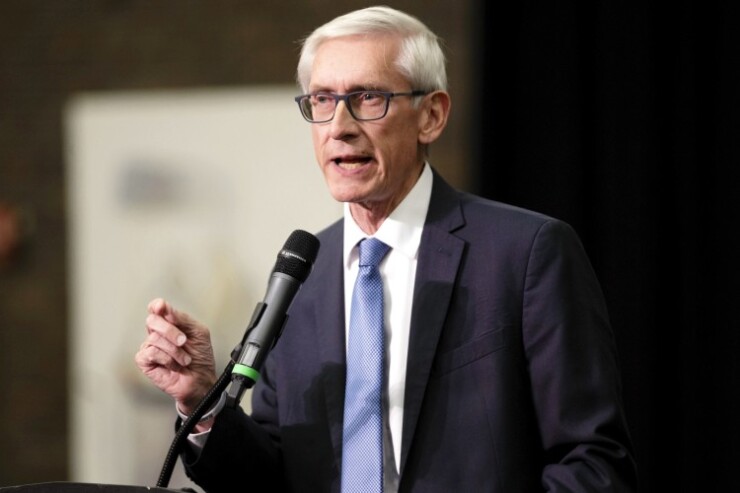Wisconsin Gov. Tony Evers vetoed a Republican plan that tapped $400 million of a projected state surplus for an income tax cut and to pay down state debt but he left the door open to a compromise if it steers additional funding to education and property tax relief.
“I am vetoing the bill because I object to its unbalanced and unsustainable approach to state fiscal policy,” Evers said in his veto message. “Specifically, this bill would reduce the estimated budget stabilization fund balance by $123.8 million in fiscal year 2020-21 according to the Legislative Fiscal Bureau.”
The current projections would boost the state’s budget reserve to more than $1 billion at the end of biennium June 30, 2021.

The package also doesn’t address the local property tax burden of funding public schools because the state has failed to meet its two-thirds funding pledge, Evers said.
“In 2018 alone, voters approved more than $2 billion in debt and revenue increases for local schools. This is not sustainable,” Evers, a Democrat who took office last year, said in vetoing the legislation passed by the Republican majorities in the Senate and Assembly last week.
Evers said he was willing to support an income tax cut and paying down some debt but only if some additional funding go towards education and property tax relief.
The Republican Assembly leader slammed the veto and said an override would be attempted. “Thanks to good budgeting and a growing economy, Wisconsin’s families should reap in our economic windfall,” Speaker Robin Vos, R-Rochester, said in a statement. “The regular session of the state Assembly has concluded. We will likely return in May to attempt to override gubernatorial vetoes.”
A two-thirds majority is needed for an override to succeed. The package passed the Assembly in a 65-34 vote and the Senate in a 19-14 vote.
Senate Majority Leader Scott Fitzgerald, R-Juneau, had said after the legislation passed that if Evers vetoed it he didn’t expect any action on the surplus until the next budget plan is crafted. Fitzgerald left a veto override attempt on the table but it would be for symbolic purposes as he likely couldn’t muster the needed votes.
The vetoed legislation cut income taxes by $250 million, cut the personal property tax on equipment purchases at a cost of $50 million, and paid off $100 million of state debt. Evers had offered his own $250 million package that primarily focused on property tax relief and education.
The Republican plan also would make a change in how future budget surpluses are managed. Under current law, when general fund tax revenues exceed projections used in the budget 50% is transferred to the budget stabilization fund.
If the balance in the budget stabilization fund prior to the transfer exceeds 5% of estimated general fund expenditures for that fiscal year, no transfer is made. The vetoed legislation would have required that debt be paid down with 50% of the surplus if the budget reserve balance exceeded 5% of estimated general fund expenses.
Debate over the surplus began in late January when the non-partisan Legislative Fiscal Bureau projected the state would close the biennium with a general fund balance of $620 million, up by $452 million from the prior projection used for the fiscal 2020-2021 $82 billion budget adopted last year.
The general fund and reserve hikes would come from more than $800 million in additional tax revenue that’s now projected through the biennium that ends June 30, 2021. About $400 million would be transferred to the state’s reserve, known as the budget stabilization fund.
About $189 million would be deposited at the end of the current fiscal year putting the reserve at $845 million and another $220 million next year pushing it up to nearly $1.1 billion. In 2011, the state’s general fund balance and budget reserve held a combined $102.2 million.





